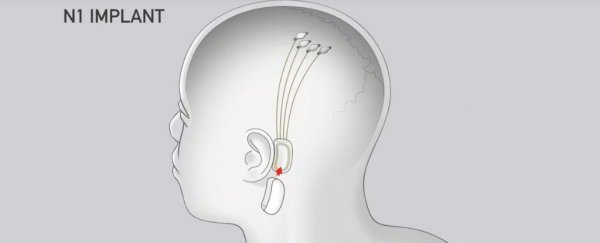Your mind and computer may have gotten one step closer.
Elon Musk on Tuesday announced in a livestream that his neurotechnology startup, Neuralink, hoped to begin implanting devices into human brains as early as next year.
"We hope to have this aspirationally in a human patient before the end of next year," Musk said at a press conference on Tuesday, where he gave updates on the progress of the system.
"So this is not far."
Musk has invested US$100 million into the secretive company since its founding in 2016, according to The New York Times. Neuralink has brought together some of the world's leading neuroscientists to its home base at a laboratory at the University of California at Davis.
Musk said the Neuralink system would allow for a tiny chip - referred to as a brain-machine interface - to be implanted into the brains of willing subjects and would allow humans to achieve "symbiosis with artificial intelligence."
Small chips, measuring roughly 4 mm by 4 mm, would be designed to stimulate neurons - or nerve cells in the human brain that communicate with other cells - using tiny flexible threads of electrodes. Each electrode thread would be inserted using a precision robot in a procedure Musk said would be as safe and painless as LASIK eye surgery.
"It's not like a major operation - it's sort of equivalent to a LASIK type of thing," he said.
Musk acknowledged the futuristic system would take time to gain approval from the Food and Drug Administration.
He said the system could be used to treat brain disorders, like Alzheimer's or Parkinson's disease, and ultimately could "preserve and enhance" brain function. He said Neuralink chips would be 1,000 times as effective as other electrode-stimulating systems out there.
Max Hodak, Neuralink's president, added that the system would be wireless and would last "years to decades."
While some have lauded Musk's attempts to create the next generation of brain-computer connection, experts say the hype surrounding the complex system may not be justified just yet.
Philipp Heiler, a physician who founded Neurofeedback Neuroboost, told Business Insider last year that such systems came with risks including brain damage, inflammation, and scarring.
"You have to ask yourself what the advantage is over other interfaces like touchscreens or language assistants like Alexa," Heiler said.
Thomas Stieglitz from the Department of Biomedical Microtechnology at the University of Freiburg in Germany told Business Insider last year that Neuralink's stated long-term goals sounded too good to be true.
"I believe Neuralink's long-term goals are unrealistic, or at least it's dubious to phrase them in such a way," Stieglitz said.
"Unless all this is clear, it's simply not possible to upload knowledge somewhere else then upload it back into the brain. While it might make for great science fiction, in reality it's just hokum."
This article was originally published by Business Insider.
More from Business Insider:
